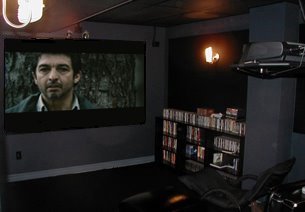KBT Presents: EL AURA

It is always a pleasure to see A-level noir cinema coming from somewhere outside of the United States or the French New Wave. And who would have expected the dark moody pleasures on offer from El Aura? After all, it is the follow up to Fabián Bielinsky’s whirlwind bubblegum con-artist flick, Nine Queens (Nueve reinas) that had Ricardo Darín talk, run and dance to the rhythms of the grift as a parable for Argentinas economic woes. While there is a moment or two of that breathless energy on display here, Bielinsky has stepped up his ambitions and taken them in the complete opposite direction for his follow-up film. The result is driving and subtle. There is no sophomore slump here.
Esteban Espinosa (Darín) is a drab figure in plain rumpled clothes first shown mysteriously sprawled on the floor of an ATM vestibule, unconscious. He wakes up disoriented, composes himself, then casually pulls his paper receipt out of the machine and walks out. Over the opening credits we see him efficiently restoring a fox skin to its former skeleton. He finishes by pasting on the glass eyes. While waiting in line to get paid for his taxidermy he spins a fantasy to his coworker about how easy it would be to rob the Buenos Aires Natural History museum. They both work there, and know the layout and if it was planned down to the smallest detail it could go off without a hitch. While impressed with his almost photographic memory for fine detail, his coworker invites him instead to go on a hunting trip down in the southern Argentinean forests. Through a convoluted series of events best left discovered at the deliciously languid pace set by the film, Espinosa gets his fantasy of pulling off a robbery while on that hunting trip. However, instead of it being meticulous and clean, it is full of hard, scarred secondary characters and muddy outcomes.
El Auras construction is anything but muddy. It is crafted with such attention to detail that the narrative threatens (but fortunately does not succeed) to drown out the key central performance. Like most good noir ‘heroes’, Espinosa is lonely, ordinary, lacking history or ties, and far craftier than he looks. Ricardo Darín has almost no dialogue to work with, but is in practically every frame. He gets unbelievable mileage out of his handsome weather-beaten visage which is capable of portraying fear, detachment, guile and sympathy within a single scene. Like the Ed the Barber in the Coen Brothers' The Man Who Wasn't There, he is both a detached onlooker and the central player. This is underscored beautifully in two wildly contrasting scenes. The first, where Espinosa has a deer in his rifles sight and his finger trembles at the dilemma of pulling the trigger. This followed by a sudden unexpected burst of action and outcome. The second is a real knockout of mise-en-scene involving him standing across the road from a factory while several men shoot the place up behind the closed gates, gunshots echoing from the distance. It is surprisingly similar to the quiet forest and the factory workers scatter like frightened animals. The camera takes in the south Argentine landscapes, dark forests with tall brooding trees and sparse impoverished rural vistas to hide secrets, bodies and greed of desperate men.
El Aura riffs on Antonioni’s The Passenger and Nolan’s Memento (sans backward narrative) with liberal dashes of Lynch’s Twin Peaks for good measure (a somewhat metaphysical dog serves well as Peaks Owls). The film has class and visual panache, even if it occasionally is lacking the soul that John Huston managed to wring out from his urban jungles. Bielinsky is so much in love with the lush density of the scenery and his own narrative complexity that he misses the opportunity to capitalize on the relationship between Espinosa and the fiery wallflower, Diana Deitrich (can you get a more 1940s sounding name?) She runs the remote cabins where he stays and smolders at the edge of the frame but rarely is allowed to fully enter the story. A pair of thugs, one hotheaded, the other cold as ice, who wander in the picture to pull Espinosa’s strings and end up reluctantly following his lead are also a tad clichéd. These are minor gripes however for a picture which runs over two hours and skillfully maintains (through pure atmosphere) a wholly existential tension down to the last shot. It is a shot which may in fact re-contextualize the entire film and demands for El Aura to be watched immediately a second time. Perhaps things are not so different from Nine Queens after all.
On a sad note, Director Fabián Bielinsky died on June 30, 2006 (at age 47). Here was one of South Americas leading lights of cinema extinguished far too early. Come out and enjoy his last film; it is a strange eulogy (the movie centers on fulfilling desires) for the man.
Thursday July 27 - Drinks at 8:00pm. Trailers and Showtime at 8:30pm.

0 Comments:
Post a Comment
<< Home